It’s downright scary to think that asthma has increased by over 300% in the last two decades and is something that now affects 20 million Americans.
Asthma is s a chronic condition that makes breathing difficult due to inflammation of the air passages. Symptoms range from mild to severe and include shortness of breath, chest tightness, and attacks of coughing or wheezing.
So what do you do if you have asthma?
Chances are your doctor will put you on asthma medication, which often has many unwanted side-effects. One type of additive in commonly prescribed asthma medication may contribute to up to 5,000 asthma-related deaths every year, in the US alone.
That’s pretty scary!
So what can you do to lessen the recurrence or severity of your asthma symptoms?
Start by changing your diet of course!
The Link Between Asthma and Nutrition
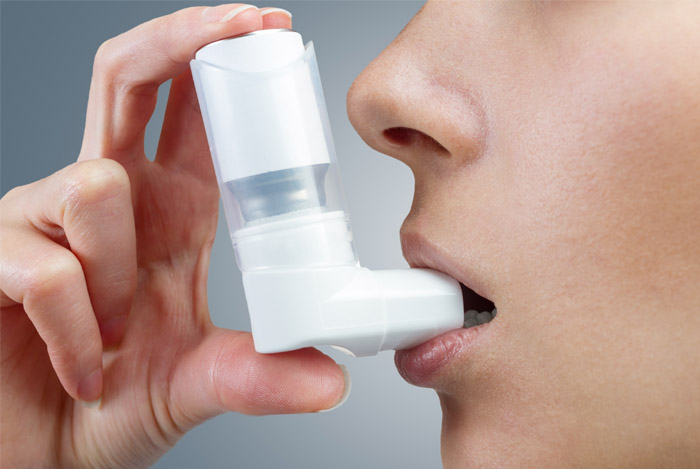 Our dietary choices can affect so much of our health, so it’s not surprising that researchers now believe that asthma is linked with diet.
Our dietary choices can affect so much of our health, so it’s not surprising that researchers now believe that asthma is linked with diet.
It’s not a coincidence that, as our diet has changed over the last few decades, so has the prevalence of asthma (and so many other health problems).
Plenty of studies, including those I mention below, show that diet can have a big impact on asthma symptoms.
So let’s explore just some of the dietary changes you can make to help ease your breathing.
Munch on Apples
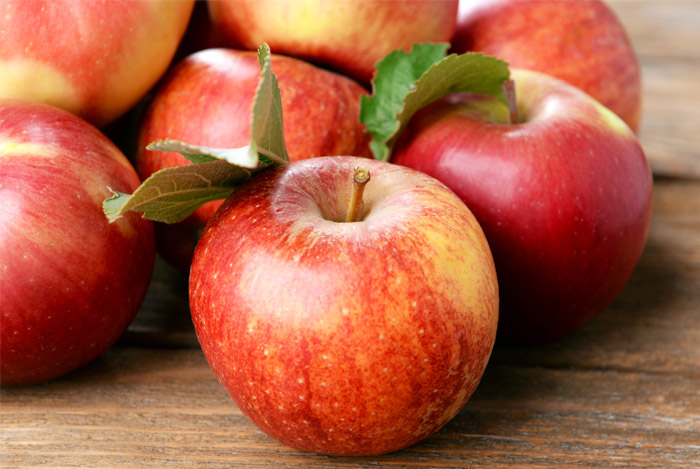 An apple a day can keep asthma away!
An apple a day can keep asthma away!
A study published in the American Journal of Respiratory Critical Care Medicine found that those who ate two to five apples a week had a 32% lower risk of asthma than people who ate less.
It’s believed that powerful antioxidants in the fruit’s peel, particularly in red apples, are responsible for the anti-asthma effects as they provide a natural antihistamine and anti-inflammatory effect.
A separate 2007 study showed that pregnant women who eat apples may protect their children from developing asthma and wheezing.
The children of women who ate 4 apples a week during pregnancy were 37% less likely to have a history of wheezing and 53% less likely to have doctor-confirmed asthma, compared with children of those who ate one or no apples per week.
Get Enough Vitamin C
 Vitamin C is a potent antioxidant that destroys damaging free radicals in the body. Because free radicals have pro-inflammatory effects, vitamin C can be considered an important anti-inflammatory too.
Vitamin C is a potent antioxidant that destroys damaging free radicals in the body. Because free radicals have pro-inflammatory effects, vitamin C can be considered an important anti-inflammatory too.
Eating a diet rich in vitamin C can help manage asthma symptoms, as it will boost the immune system and stop inflammation of the air passages.
One study of Japanese schoolchildren found that those with the highest intake of vitamin C (and vitamin E) were less likely to suffer from asthma than those with lower intakes.
Eating a variety of fruits and vegetables is the best way to ensure you get enough vitamins in your diet.
The following foods more than exceed the recommended daily dosage of vitamin C: one yellow or red bell pepper, one guava fruit, a medium stalk of broccoli or one cup of chopped kale.
Don’t Forget Vitamin D
 According to the National Health and Nutrition Examination Survey, 50% of children aged one to five, and 70% of those aged 6 to 11, have insufficient levels of vitamin D.
According to the National Health and Nutrition Examination Survey, 50% of children aged one to five, and 70% of those aged 6 to 11, have insufficient levels of vitamin D.
It’s not just children getting too little of this vitamin – research calculates that around three-quarters of teenagers and adults are deficient.
Vitamin D is not only vital for healthy bones, muscles, heart, brain and immune system but it also plays an important role in lung development and function. And of course, asthma is a lung disease.
A lack of vitamin D has been linked to a 50% increase in the risk of severe asthma attacks in asthmatic children.
Another study shows that vitamin D gained through sun exposure during pregnancy significantly reduces the incidence of asthma in the child.
In addition to getting vitamin D from the sun, certain food sources like tuna, salmon, eggs and cheese contain vitamin D. Supplements are another good option, particularly for vegetarians or vegans.
Learn everything you need to know about the sunshine vitamin here.
Smell the Coffee
 Caffeine may work for asthmatics because it’s a mild natural antihistamine.
Caffeine may work for asthmatics because it’s a mild natural antihistamine.
It appears to open up the airways, albeit modestly, in those with asthma. The effects last for up to four hours.
Even a small dose of caffeine (less than what’s in a cup of Starbucks coffee) could improve lung function for up to two hours.
Other research shows that two cups of strong coffee, taken during an asthma attack, can significantly reduce symptoms.
However, this isn’t recommended as a regular treatment for those with asthma, particularly as the body can get used to the effects of caffeine.
Don’t forget that coffee has an impressive list of other health benefits too – from fighting depression to lowering your risk of cancer.
Ditch the Salt
 Following a low-sodium diet, or at least sticking to national guidelines on salt intake (it’s 1,500mg a day by the way), is a wise choice for those with asthma.
Following a low-sodium diet, or at least sticking to national guidelines on salt intake (it’s 1,500mg a day by the way), is a wise choice for those with asthma.
Like I mentioned, a change in diet is linked with a rise in asthma. One of those dietary changes is a dramatic increase in salt consumption.
Large increases in salt intake have been linked with physical deterioration and increased risk of death in men with asthma. Other studies have shown a strong association between salt and asthma mortality in both men and children but, interestingly, not women.
People with exercise-induced asthma (EIA) should also cut down on salt.
Researchers at Indiana University found that people with EIA experience improved lung function, fewer markers of inflammation and less constricted airways when following a low-sodium diet.
Always read labels and check out my post to discover which foods have crazy high levels of hidden salt.
Add Some Flavor
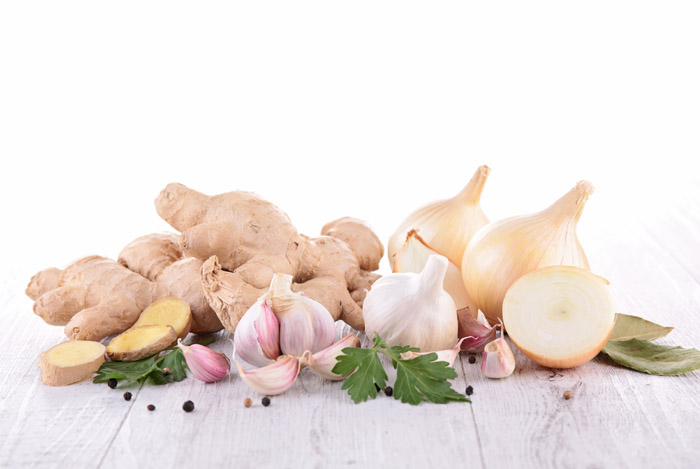 Instead of salt, flavor your foods with plenty of ginger, garlic and onions – all thought to help with symptoms of asthma.
Instead of salt, flavor your foods with plenty of ginger, garlic and onions – all thought to help with symptoms of asthma.
A study has found that adding ginger compounds to isoproterenol, a type of asthma medication, enhanced its bronchodilating effects. This means the medication was more effective at opening up the airways.
While ginger may not be a cure for asthma, it might be useful to use in conjunction with other asthma treatments.
And, according to Dr. Josh Axe, garlic and onions may improve asthma conditions thanks to a compound in them called allicin. You may remember that I’ve spoken about allicin and it’s amazing benefits before.
In addition, yellow and red onions and shallots contain a compound called quercetin, which has been shown in laboratory tests to open up the airways and help ease breathing.
Enjoy other spices with caution though, as they can often trigger allergy or asthma symptoms.
Eat Beneficial Bugs
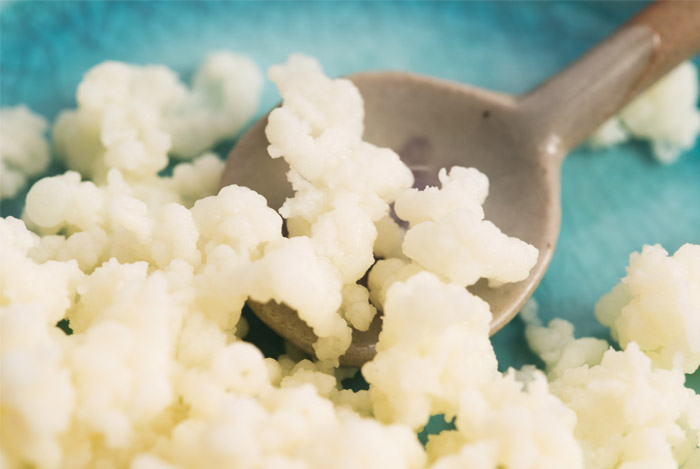 An incredible 80% of your immune system is estimated to reside in your gut. That means supporting digestive health is vital for fighting illness, including asthma and allergies.
An incredible 80% of your immune system is estimated to reside in your gut. That means supporting digestive health is vital for fighting illness, including asthma and allergies.
One of the best ways to enjoy a healthy gut is to eat a balanced, nutrient-rich diet that includes some fermented or probiotic foods – those rich in beneficial bacteria.
Research published in 2015 found that infants can be protected from getting asthma if they acquire certain types of gut bacteria.
Probiotics also reduce inflammation in the body and the airways.
Try natural yogurt, kefir, kombucha, miso, and kimchi for a regular dose of friendly bacteria.
Balance your Omegas
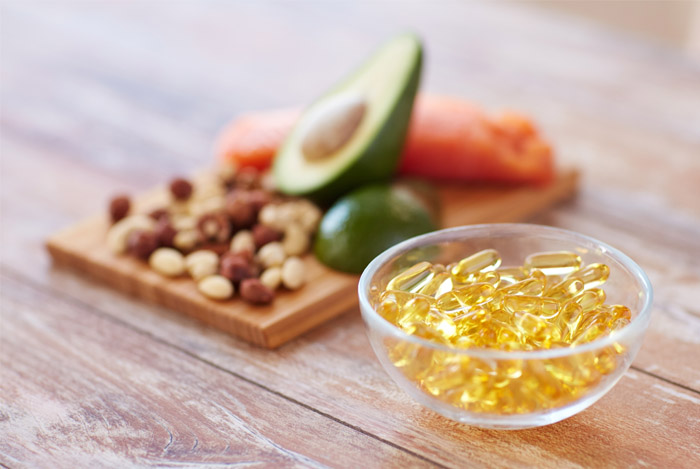 Omega 3 and omega 6 are types of essential fatty acids that we get through diet.
Omega 3 and omega 6 are types of essential fatty acids that we get through diet.
Unfortunately, the standard western diet contains several times more omega 6 than omega 3, causing the ratio of the two to become out of balance. This leads to illness, hormonal imbalance and inflammation…something all asthma sufferers should avoid.
To restore balance, you’ll want to avoid vegetable oils that are high in omega 6s. Processed foods are loaded with these inflammation-promoting oils too.
Eat plenty of anti-inflammatory omega 3 fats from foods like oily fish, flaxseeds, chia seeds and walnuts. Fish and fish oil might be especially helpful in both the prevention and treatment of asthma.
A 2008 study showed that the teenage children of women who took fish oil during pregnancy were less likely to have developed asthma.
Another small study of children with asthma found that those who supplemented with fish oil for ten months had fewer symptoms than those that didn’t.
Meet your Magnesium Needs
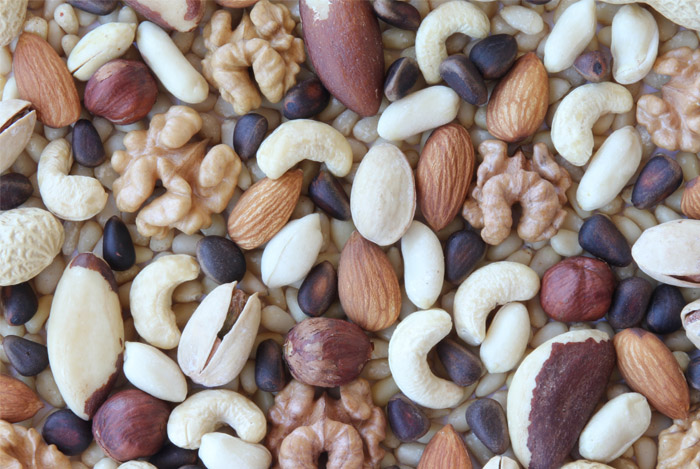 Magnesium is considered to be a safe and effective treatment for moderate to severe asthma in adults, when used in conjunction with other treatments.
Magnesium is considered to be a safe and effective treatment for moderate to severe asthma in adults, when used in conjunction with other treatments.
While researchers aren’t exactly sure of magnesium’s relationship with asthma, asthmatics are often found to have low levels of magnesium.
What’s more, low magnesium intake is associated with diminished lung function – including a smaller lung capacity and decreased airway flow.
Magnesium is the most powerful muscle relaxation mineral available, says Dr. Mark Hyman, meaning it can help relax the muscles surrounding the airways and keeps them open.
Food sources of magnesium include whole grains, leafy green vegetables, nuts and beans.
Are you magnesium deficient?
You could be, especially if any of these warning signs apply to you.
Skip the Junk Food
 We all know that processed foods and fast food like McDonald’s are terrible for our health. If you have asthma they may be even more dangerous.
We all know that processed foods and fast food like McDonald’s are terrible for our health. If you have asthma they may be even more dangerous.
Firstly, they’re filled with omega 6 fatty acids and trans fats, both of which promote inflammation.
Secondly, in order to make them appealing, these foods are colored and flavored with a variety of chemical additives (such as aspartame), many of which have been known to trigger asthma.
School children who eat at least one hamburger a week are 75% more likely to have asthma and almost 100% more likely to suffer wheezing problems, says a New Zealand study.
Other junk food and sodas were also found to increase asthma risk.
Maintain a Healthy Weight
 According to numerous studies, people who are obese are more likely to have more severe asthma symptoms than those who have a normal body mass.
According to numerous studies, people who are obese are more likely to have more severe asthma symptoms than those who have a normal body mass.
Obesity is associated with worse asthma flare-ups and an increase in hospitalizations related to the disease. And adults who are overweight or obese experience significant improvements in their symptoms when they lose weight.
The bottom line – if you’re overweight and asthmatic, you’re not doing yourself any favors.
Eat a healthy, well-balanced diet and talk to your doctor about a safe exercise regimen. Once you shed the extra pounds, you’ll feel and look great.
Avoid Alcohol
 Ever notice that alcohol makes you suffer more than the usual hangover?
Ever notice that alcohol makes you suffer more than the usual hangover?
I’m talking wheezing and chest tightness here. Maybe you even need your inhaler more often the day after a couple of beers.
An Australian study found that 33% of participants said alcohol brought on asthma symptoms, with 26% saying asthma was the main adverse symptom they experienced after drinking.
Red wine was the worst offender, causing symptoms in 24% of those surveyed, with white wine causing symptoms in 22%.
Alcohol-induced asthma symptoms are twice as frequent in women rather than in men, says a 2005 study.
So, what’s in alcohol, particularly wine, that makes is so bad for asthmatics?
Most likely both the histamines and sulfites. Histamines cause swollen glands and airway inflammation while sulfites are known to worsen allergy and asthma symptoms.
Follow a Mediterranean Diet
 A Mediterranean diet is thought to be one of the healthiest diets you can follow. It’s linked to everything from a healthier heart and a lower risk of obesity to a lower risk of asthma.
A Mediterranean diet is thought to be one of the healthiest diets you can follow. It’s linked to everything from a healthier heart and a lower risk of obesity to a lower risk of asthma.
In fact, asthma is less prevalent in the Mediterranean region, which may be explained by their healthy diet full of good fats, olive oil, fish, beans, whole grains fruits and vegetables and very low meat consumption.
Studies have shown that sticking to a traditional Mediterranean diet during childhood can offer significant protection from symptoms of asthma.
Even some of the effects of living in an urban environment (which increases asthma risk) are offset by following this healthy eating plan, according to a 2011 study of over 1,100 children.
It’s probably because it’s so rich in antioxidants and anti-inflammatory fruits and vegetables, omega 3s and other important asthma-reducing nutrients.
Of course, you don’t have to live in sunny Spain to benefit from this way of eating.
Want to know what eating on a Mediterranean diet looks like? Check out these five great Mediterranean meal plans that I’ve come up with.
Overall…
 Asthma can be a worrying and life-limiting disease but, by altering your lifestyle and dietary choices, you can try take control of the symptoms of your condition.
Asthma can be a worrying and life-limiting disease but, by altering your lifestyle and dietary choices, you can try take control of the symptoms of your condition.
I hope I’ve given you some helpful tips that you can integrate into your current way of eating. Of course, I’m not a doctor, so always consult yours before making any major dietary changes.
Do you find any particular foods improve, or worsen, your symptoms of asthma?
The post 13 Healthy Eating Tips for Asthma Sufferers appeared first on Nutrition Secrets.
http://www.nutritionsecrets.com/asthma-diet/
No comments:
Post a Comment